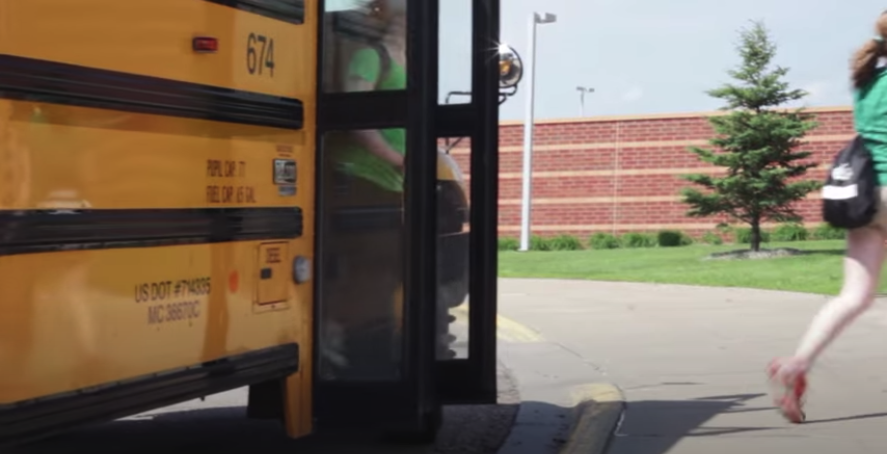Electric school bus research project leads to publication and research partnership benefiting Sustainable Carolina
March 3, 2022
Melanie Elliott hadn’t planned to become a sustainability analyst for Sustainable Carolina when she first arrived at the University of North Carolina at Chapel Hill after leaving a career in restaurant management. With a desire to do something she felt would have a broader impact on the world, she originally came to Carolina interested in studying astrophysics. However, her focus shifted when she discovered she could use physics to analyze renewable energy and the environment.
“Astrophysics felt important, but as time progressed, it felt like there were things that I could be doing with my education that were more impactful on earth instead of other galaxies,” Elliott said.
This focus on renewable energy led her to connect with Noah Kittner, a researcher and assistant professor at UNC-Chapel Hill who shared her interest in energy systems. Elliott met with Kittner in the spring of 2020 and pitched a research proposal for her senior research project. Kittner agreed to work with her.
Elliott’s and Kittner’s work focused on modeling the potential emission reductions and grid stabilization benefits of using the batteries of electric school buses to help utilities reduce peak energy demands in North Carolina. The research calculates the potential benefits of fully electric school bus fleets across North Carolina. The results of this modeling showed that there would be significant carbon dioxide emission reductions from charging and discharging the buses’ batteries at strategic times of the day, even while working around school schedules.
“I think that it would be wise to consider the other possible benefits of these vehicles,” said Elliott. “If they’re coming anyway, we may as well be using them to stabilize the grid.”
The pair focused on school buses because they are fleet vehicles and move on a set schedule. The batteries are also significantly larger than other electric vehicles’ (EV) batteries. Because of the battery size, the buses can also discharge energy back into the grid if needed, which provides an added stabilization benefit. This bidirectional battery usage is called a vehicle-to-grid (V2G) service. V2G services could also be used to support variable renewable energy sources such as solar and wind across the state.
Beyond grid benefits, Kittner explained that this model indicates that there would be added health benefits if NC schools switched to electric school buses. He noted that children’s proximity to the diesel emissions from traditional school buses would disappear.
“It just kind of shows that as school districts make plans to reduce their emissions, school buses might be a part of that strategy,” he said. “And if you get kids to understand more about greenhouse gas emissions and health benefits as part of the process, it can leave a long-term impact on developing sustainable solutions in the future too.”
Elliott graduated in 2021 with a bachelor’s degree in physics and astronomy and was hired as a sustainability analyst with Sustainable Carolina, a university initiative based out of IE that aims to advance and amplify all sustainability activities at UNC-Chapel Hill. She now completes data analysis projects and coordinates with many different campus facilities to form viable sustainability plans for the university.
Kittner is also excited about the future of Sustainable Carolina and its partnerships with researchers at UNC-Chapel Hill. He said that UNC Institute for the Environment brings together students through research and classes, and working with Sustainable Carolina would be a good way for students to get involved with applied research.
“Sustainable Carolina is driving a lot of the sustainability decisions on campus to look at different research projects and ways to impact the local community,” he said. “The Sustainability Council incorporates faculty research and different people on campus committed to sustainability; it’s a good way to link between the classroom and real projects.”
Although Elliott’s focus has shifted from her undergraduate research to her work at Sustainable Carolina, the paper by her and Kittner was published online in Dec. 2021 by Sustainable Production and Consumption. While their research model estimates the potential benefits for every school bus in the state becoming electric, the beginnings of this transition are already happening in certain school districts in NC.
Duke Energy recently submitted a project proposal approved by the North Carolina Utilities Commission to partner with NC school districts and pilot several electric school bus replacements. Kittner noted that this project may provide more data to analyze potential emissions reduction impacts in school districts as well.
Overall, Kittner said that it was a great experience working with Elliott, and her initiative and interest in electric vehicles directed most of the V2G project’s focus and work. He plans to collaborate on more research with Sustainable Carolina in the future through his lab group.
“This research shows what the possibilities would be if the entire state did this,” Elliott said. “The implications are great for the state and great for the grid.”
Story by Sarah Padyk
This semester, Sarah Padyk is working as an environmental communications intern. As an environment and science communication dual degree student, Sarah is working towards a B.S. in environmental science and an M.A. in media and communication. She originally got involved with IE as a Cleantech Corner intern, and she recently interned with The Nature Conservancy in North Carolina. After graduating with her master’s degree in 2023, Sarah plans to pursue a career in environmental communication with a focus on energy systems.
